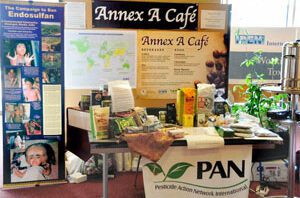Contact:
Medha Chandra, PAN North America
(415) 981-6205 x327, mchandra@panna.org
Tuesday, April 26, 2011
@font-face {
font-family: “Cambria”;
}p.MsoNormal, li.MsoNormal, div.MsoNormal { margin: 0in 0in 0.0001pt; font-size: 12pt; font-family: “Times New Roman”; }div.Section1 { page: Section1; }
NGOs Host Endosulfan-free Cafe at Geneva Meeting
Health & community groups around the world call for an end to endosulfan
Health and community leaders from across the globe are serving organic coffee, cashews and chocolate — free of the pesticide endosulfan — to Stockholm Convention delegates in Geneva. At the gathering this week the governments will decide whether to include the persistent insecticide in the Convention, which would ban it in the 173 countries that are Parties to the treaty.
@font-face {
font-family: “Cambria”;
}p.MsoNormal, li.MsoNormal, div.MsoNormal { margin: 0in 0in 0.0001pt; font-size: 12pt; font-family: “Times New Roman”; }div.Section1 { page: Section1; }
@font-face {
font-family: “Cambria”;
}p.MsoNormal, li.MsoNormal, div.MsoNormal { margin: 0in 0in 0.0001pt; font-size: 12pt; font-family: “Times New Roman”; }div.Section1 { page: Section1; }
“Among the largest remaining users of endosulfan are the cotton, soy, coffee, chocolate, and tea industries in certain countries,” explains Karl Tupper, Staff Scientist with Pesticide Action Network (PAN) North America. “By featuring organic examples of these products from around the world in our Café, we’re demonstrating that endosulfan-free production is not only possible but also profitable — proving false the claims from the pesticide industry that endosulfan is necessary for growing these crops.”
The Stockholm Convention on Persistent Organic Pollutants (also known as the “POPs Treaty”) aims to protect human health and the environment by eliminating chemicals that are the ‘worst of the worst’: those that are simultaneously toxic, bioaccumulative, persistent, and mobile in the global environment. Endosulfan has been recommended by the treaty’s POPs Review Committee for addition to the list of 21 chemicals already slated for global phaseout.
The NGO ‘café’ will feature endosulfan-free organic coffee from Brazil, Indonesia, Ethiopia, Costa Rica, Mexico, India and other countries, organic cashews from India, chocolate made from organic cocoa from various Latin American nations and organic tea from China, India, and Sri Lanka. The free café, which is open periodically throughout the week, is called “The Annex A Café,” after the section of the Convention where endosulfan would be listed for phaseout.
“Many less toxic and safer alternatives to endosulfan are being used successfully around the globe — from cotton farms in West Africa to coffee growers in Latin America to tea plantations in Asia. There is no excuse for keeping a toxic insecticide like endosulfan on the market,” says Dr. Mariann Lloyd-Smith of the International POPs Elimination Network (IPEN). Many of these alternatives to endosulfan have been well documented, and the NGOs are making information about them available to meeting delegates.
NGOs serving the delegates will be wearing t-shirts made from organic cotton grown in India, provided by the company Pants2Poverty, which sources organic cotton from both India and West Africa. Many other food items grown without endosulfan, such as soy and sugarcane, are also on display at the Café.
Endosulfan is a toxic insecticide that persists in the environment and accumulates in humans and animals. It causes reproductive harm and birth defects in humans, as has been seen in the tragic cases from Kerala, India. “The human health harms of endosulfan are horrific — as victims from the state of Kerala testify,” says Jayakumar Chelaton of the Indian NGO Thanal. “Governments cannot continue putting the profit motive above the health of people — they must ban endosulfan.”
“In addition to the tragic developmental effects and birth defects highlighted in Kerala, endosulfan has also been linked to cancer, hormone disruption and long term neurological effects such as epilepsy and autism”, says Dr. Meriel Watts of PAN Asia and the Pacific. “There have also been many deaths from acute poisoning, especially amongst farmers using endosulfan in the cotton fields of Africa. Endosulfan’s human health harms are well understood and 80 countries around the world have already banned it or are phasing it out.”
Endosulfan travels long distances on air and water currents, and, through a process known as global distillation, accumulates in colder Northern latitudes such as the Arctic regions — thousands of miles from where it was originally used. “Endosulfan affects Indigenous Peoples where it is used, at the original source of contamination, and accumulates from around the globe in the circumpolar Arctic where it contaminates the bodies of our peoples, especially unborn and young children, and traditional food sources such as marine mammals. This is a violation of our internationally-recognized human rights as Indigenous Peoples,” says Andrea Carmen of the International Indian Treaty Council (IITC).
“Endosulfan is contaminating the traditional foods of Arctic Indigenous Peoples,” agrees Vi Waghiyi, a Yupik woman from St. Lawrence Island, Alaska, and Environmental Health and Justice Program Director with Alaska Community Action on Toxics. “This is an affront to our human rights, our health, the health of our children and to our cultures. We are among the most highly contaminated people on earth because of the accumulation of persistent organic pollutants in the Arctic. We urge the COP5 delegates to take immediate action by including endosulfan in Annex A and continue work toward eliminating all POPs.”
Innovative farmers are using cutting edge practices, to achieve good outputs in key crops in Africa, Asia and Latin America without using endosulfan. “Organic practices are the safest, most effective and highly productive approaches to growing crops without endosulfan,” says Dr. Abou Thiam of PAN Africa.
“Endosulfan is unnecessary,” adds Javier Souza of Red de Acción en Plaguicidas y sus Alternativas para América Latina (RAPAL). “In Latin America, coffee, fruit, vegetables, sugar and soy are all produced without endosulfan. We call upon the nations around the world to support a global ban on endosulfan. It is high time that public health is valued above corporate profits.”
Available for interviews:
Andrea Carmen, IITC. Contact: andrea@treatycouncil.org
Jayakumar Chelaton, Thanal, India. Contact: jayakumar.c@gmail.com
Dr. Mariann Lloyd- Smith, IPEN. Contact: biomap@oztoxics.org +6-141-362-1557
Javier Souza, RAPAL, Contact: javierrapal@yahoo.com.ar
Dr. Abou Thiam, PAN Africa, Contact: abouthiam@pan-afrique.org
Karl Tupper, PAN North America, Contact: karl@panna.org
Vi Waghiyi, Alaska Community Action on Toxics. Contact: vi@akaction.net
Dr. Meriel Watts, PAN Asia and the Pacific, Contact: merielwatts@xtra.co.nz +64-21-1807830
This is a joint release of the following organizations:








